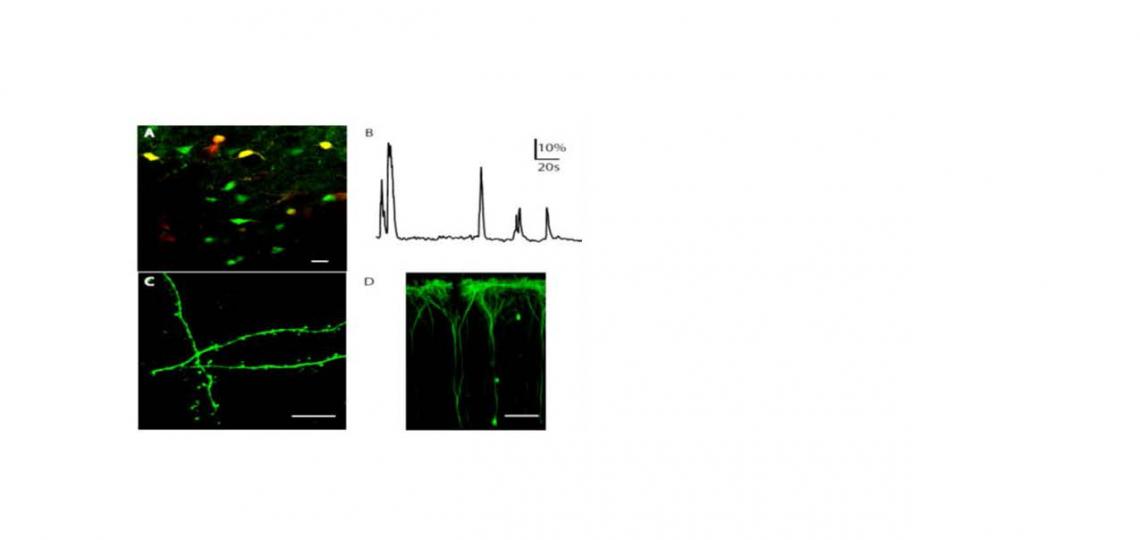About the Core
The Microscopy Core includes four confocal microscopes and one two-photon microscopy suite. The confocal microscopes include a ZEISS 510 system with three lasers (488, 543, and 633 nm), a Leica SP8 with five lasers (405, 488, 561, 594 and 633 nm), and a ZEISS 710 and a ZEISS 880 Airyscan both with four lasers (405, 488, 561, and 633 nm). All four confocal microscopes are designated for fixed fluorescent tissues or cells. The ZEISS 710 has an additional incubator for temperature and CO2 control and may be used for live imaging.
The two-photon suite contains two Carl ZEISS multi-photon microscopes LSM 7MP, and one coherent two-photon laser with wavelength range from 680-1080 nm. The LSM 7MP is used for advanced 3-D image acquisition from live tissues, organs, embryos and animals, as well as time-lapse imaging. One LSM 7MP is set up for in vitro imaging, such as acute or cultured brain slices, cultured stem cells, or neurons. The accessory equipment such as a heater and dual-headed electrophysiological patch-clamp recording machine is available. The setup can be used to simultaneously capture images and record electrical signals. The other LSM 7MP is set up for in vivo imaging of animals, such as imaging mice with cranial windows. Using this setup, a mouse brain can be imaged in live mice using a cranial window or images can be taken from acute slices with fluorescent dyes. (Figure1).
Approved investigators are given 24/7 access to the microscope suites, which includes dedicated powerful PC workstations with necessary analysis software, including Imaris (Bitplane) and Neurolucida.
The Microscopy Core is currently used by 28 labs and more than 100 users. To expand our ability of services, we are in the process of purchasing three more confocal microscopes including one Leica SP8, one Leica SP8 STED3X, and one Nikon spinning disk confocal microscope. With a spinning disk confocal microscope and super-resolution imaging with the Leica SP8 STED3X, we will have the ability to provide even faster imaging acquisition.
Figure 1. Imaging of mouse brain using two-photon microscopy. (A) Sample two-photon dorsal striatum image of mouse brain acute slices loaded with OBG-1 (Green, neurons and astrocytes,). The astrocytes were stained with SR-101 (red without loading of OBG-1, yellow with loading of both OBG-1 and SR 101). Scale bar, 10 µm. (B) Representative calcium transients of striatum neuron loaded with OBG-1. The percentage change of amplitude was calculated as relative fluorescence change ΔF/F. (C). The neuronal dendrite with spines and (D). The layer 5 neuron projection its dendrites to layer 2/3 were imaged through Thy1-GFP mouse cranial window. Scale bar, 10 µm and 50 uM separately.
Services Available
- Confocal microscopy
- Two-photon microscopy
- ZEISS ApoTome
- Stereology
- Data Analysis (Imaris and Neurolucida)
Information for Users
For scheduling training and discussing project details, please contact Dinghui Yu at dyu@bcm.edu . All prospective users must provide a charge source before undertaking training. Requests to the facility are generally handled on a first-come, first-served basis. Priority is given to BCM-IDDRC members, especially those with long-term and intensive usage of the system required by their projects. Time reserved but not canceled at least two hours in advance will be charged at the usual rate.
Recent Publications Using the Core:
- Dinghui Yu, Ying Tan, Molee Chakraborty, Seth Tomchik and Ronald L. Davis. Elongator complex is required for long-term olfactory memory formation in Drosophila. Learn Mem. 2018 25(4):183-96.
- Hui Lu, Ryan T.Ash, Lingjie He, Sara E. Kee, Wei Wang, Dinghui Yu,...Huda Y. Zoghbi. Loss and Gain of MeCP2 Cause Similar Hippocampal Circuit Dysfunction that Is Rescued by Deep Brain Stimulation in a Rett Syndrome Mouse Model. Neuron, 2016 91(4): 739-47.
Acknowledgement
IDDRC Investigators: We ask that users acknowledge the use of this core as follows:
"The project described was supported in part by the Microscopy Core at Baylor College of Medicine, which is supported by IDDRC grant number P50103555 from the Eunice Kennedy Shriver National Institute of Child Health & Human Development. the content is solely the responsibility of the authors and does not necessarily represent the officials view of the Eunice Kennedy Shriver National Institute of Child Health & Human Development or the National Institutes of Health."








 Credit
Credit
